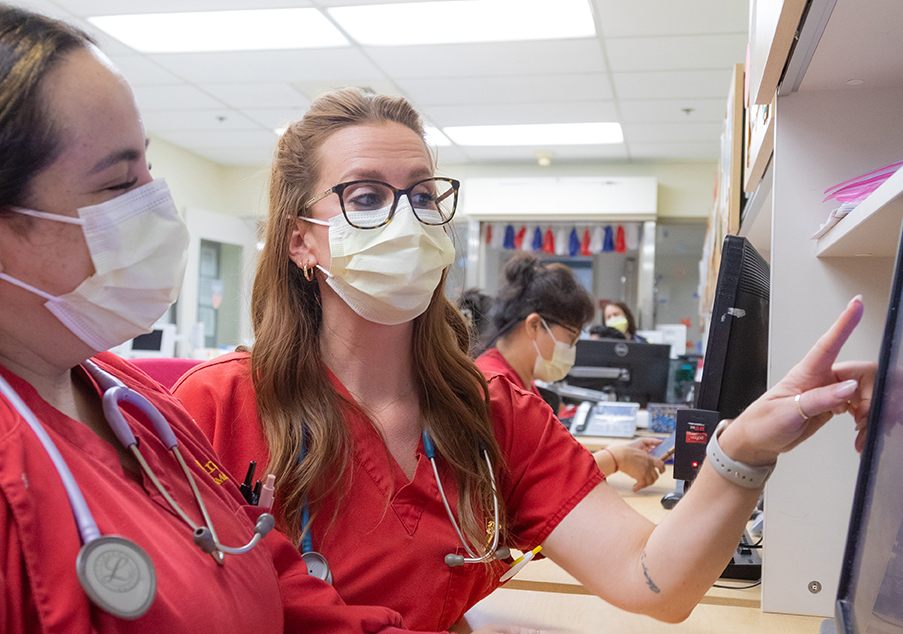My Specialty
Oncology Nursing, Leah Allen, USC Norris Cancer Center
Using teamwork and the latest therapies to battle cancer

Leah Allen, RN, BSN, BMTCN
Clinical Nurse, Oncology/ Hematology/Bone Marrow Transplant
USC Norris Comprehensive Cancer Center
Los Angeles
Please share the arc of your nursing career.
After I graduated, I worked in a hematology/ oncology position in Indiana before realizing that my love of travel and my love of oncology nursing could go hand in hand. I started my first travel assignment, in Scottsdale, Ariz., in October 2014.
I came to USC Norris Comprehensive Cancer Center in April 2015. I originally intended it to be just another stop on a long list of travels. Long story short, I fell in love with nursing at Norris, and nine years later, I’m still here!
How did you become interested in the area of oncology?
When I was younger, my grandfather died of multiple myeloma, my mom’s best friend died of breast cancer, my dad was diagnosed (thankfully very early) with colon cancer, and my grandma died of breast cancer. I think having so much cancer around me sparked my interest.
I originally leaned towards pediatric oncology, but during clinicals at school, I realized I was intrigued by hematology, oncology, and bone marrow transplant, regardless of the patients’ ages.
What changes have you seen during your time working in cancer care?
When I started out, the last line for many patients was getting a transplant. If that failed or they relapsed, there’d be nothing left to offer. New treatments have revolutionized cancer treatment — in particular CAR (chimeric antigen receptor) T-cell therapy, where they take and genetically modify a patient’s T-cells and then infuse them back into the patient. We’ve had many patients undergo CAR T therapy with us. It’s been amazing to witness these changes in cancer care, and it just keeps getting better.
Tell us about some of your current responsibilities.
I work as a nurse on the third floor, as well as a relief charge nurse. I’m also a member of several committees, and I educate our staff on preventing CLABSI (central line associated bloodstream infection). Since central lines are very common in cancer treatment, it’s crucial for us to do everything in our power to prevent infection. We hold four-hour “Camp CLABSI” educational programs multiple times a year.
I’ve also been involved with the unit practice council, and I’m part of our Magnet committee. I love being on committees because it makes me feel more connected. It’s so enjoyable watching things you’re part of bring about positive change.
What do you love most about your work?
Being there for my patients during some of their hardest times in life. Cancer is random, and we’ve all likely known people who’ve had the disease — it could literally be any of us lying in that hospital bed. I feel blessed to be the helping hand for people experiencing their cancer journeys. I also love my coworkers. There’s such a strong bond that comes with going through this line of work with people you love, trust, and respect
How do you approach a patient and their family when the prognosis is poor?
In my field, you must observe the stages of grief. It varies from person to person, so I try to do or say what I feel that person needs, which can change throughout one 12-hour shift. Sometimes, they may need time alone; sometimes, they only want their family or friends with them; and sometimes, they need a hug and to know they’re not alone. I think the most powerful thing we can do is listen and be present in whichever way they need.
Could you share a HIPAA-compliant patient story?
A recent one was bonding with a patient (and her mom) over our shared love of Taylor Swift. The patient was getting a transplant, so we planned that when her counts went back up, we’d throw a friendship bracelet party in the waiting room. Staff, patients, and the patient’s family all joined in, singing or humming along. It brings me such joy to recall the smiles on the faces of everyone who participated.
What are your career aspirations?
I love my job, and I aspire to keep it that way. I want to just keep learning about all the changes within the field of cancer treatment, gain more certifications, and continue to be a resource for my colleagues and our patients.
KEITH CARLSON, RN, BSN, NC-BC, has worked as a nurse since 1996 and offers expert professional coaching at www.nursekeith.com.
In this Article: Career Advice, Oncology


